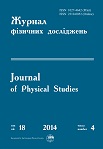DOI: https://doi.org/10.30970/jps.01.477
PHYSICS AND PHILOSOPHY: DO THEY NEED EACH OTHER?

|
Journal of Physical Studies 1(4), 477–489 (1997)
DOI: https://doi.org/10.30970/jps.01.477 PHYSICS AND PHILOSOPHY: DO THEY NEED EACH OTHER? |
 |
R. Gaida
Institute for Condensed Matter Physics of the Ukrainian Acad. Sci.
1 Svientsitskii Str., Lviv, UA–290011, Ukraine
The article is devoted to the consideration of some philosophic problems of modern physics. It is emphasized that on the one hand the philosophic ideas helped to solve difficult gnosiological problems which had arisen during the passage from classical physics to the relativistic theory and quantum mechanics. On the other hand the analysis of such problems favoured the progress of modern philosophy. Quotations of prominent physicists of the 20th century (A.~Einstein, N.~Bohr, W.~Heisenberg and others) about great importance of philosophic concepts for development of modern physics are examined. Problems of the structure of theoretical physics and the relationship between theory and experiment are discussed. Three types of physical theories exist: phenomenological, fundamental and structural. The development of ideas about the correlation between the subject and object of cognition is analysed within the context of the formation of the relativistic theory and quantum mechanics. Examples of the application of Bohr's complementary principle to the problems beyond physics are given. The causal and teleological explanation of physical phenomena is discussed. The conclusion is that philosophic education should be a constituent of the university courses of physics. Peculiar features of physics and physicist's way of thinking should be taken into account. It is necessary that the students of philosophic faculties should study the basic concepts of modern physics and their philosophic aspects. The opinion is expressed that the above problems are insufficiently covered in textbooks on philosophy. Therefore, scientists, and physicists among them, should be involved in preparing lecture courses and manuals on philosophy. It also seems to be expedient to diversify the training of philosophers in order that some of them could specialize in natural philosophy.